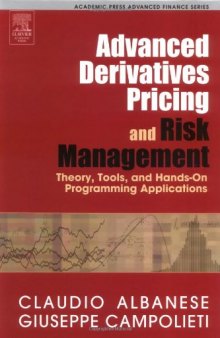 جزییات کتاب
جزییات کتاب
It is definitely advanced but is not intimidating. Any great book provides the reader with a base of knowledge and then builds from there. Being somewhat familiar with Dr. Campolieti's work, I can definitely say that he is a pioneer in this field and will continue to do great things for analytical finance. It is written using very consistent notation and in a properly paced fashion. This is especially important for those that are new to quantitative finance. The theoretical component of the book provides the reader with a solid base for experimenting with the Visual Basic for Applications (VBA) projects. What I really liked about the hands-on programming component of this book is that it shows the reader that algorithms and results can be rapidly implemented using Excel as the interface and VBA for coding. This dramatically reduces learning time since most financial practioners are already very familiar and comfortable with Excel. Readers that find programming a challenge will benefit from the numerous and well documented projects. Having worked in actuarial, risk management and trading contexts, I can honestly say that being able to deploy analytical applications on the fly is an enormous advantage. Let's not forget that the authors have bundled with this book their code libraries that can be used (perpetually) by the reader independent of the content / projects in this book. This alone is worth more than the book's sticker price.In terms of more advanced readers, the material presented in this book is not trivial. It elegantly presents difficult topics on many levels. A good understanding of linear algebra, probability, statistics and differential equations will make the material enjoyable. For those not terribly familiar with the "finance" part of mathematical finance, I highly recommend any of John Hull's derivative books as a quick first read and primer on the many financial concepts presented here.



 دانلود کتاب
دانلود کتاب

 جزییات کتاب
جزییات کتاب





 این کتاب رو مطالعه کردید؟ نظر شما چیست؟
این کتاب رو مطالعه کردید؟ نظر شما چیست؟
